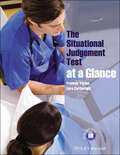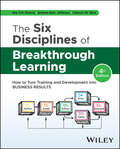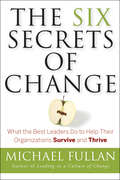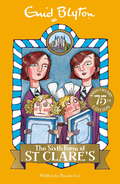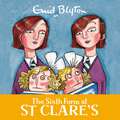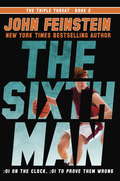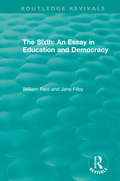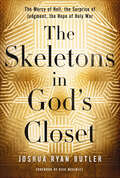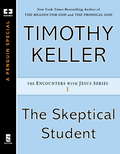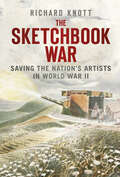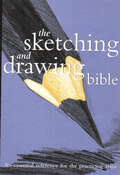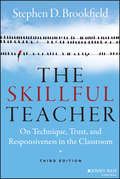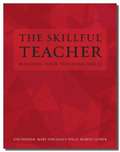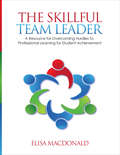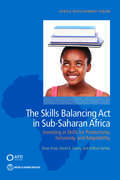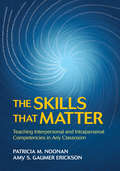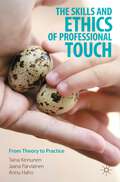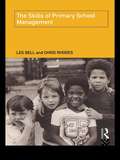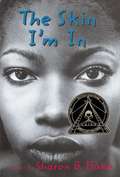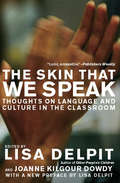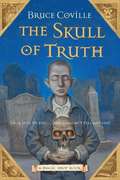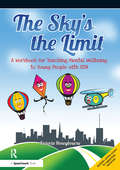- Table View
- List View
The Situational Judgement Test at a Glance (At A Glance Ser.)
by Lara Cartwright Frances VarianThe Situational Judgement Test at a Glance provides a sound introduction to the SJT and details ways you can prepare before the assessment. It includes worked case examples based on real-life scenarios which have been reviewed by experienced clinicians and examiners. The book draws out key aspects of professional practice relevant to the role of a junior doctor. This is based on the nine domains as outlined by the ISFP (Improving Selection to Foundation Programme), who detailed the behaviours necessary to be a competent Foundation Doctor. The overall aim of The Situational Judgement Test at a Glance is not to spoon feed hundreds of practice questions or reams of guidelines, but to steer you towards a logical way of approaching best medical practice - and therefore the SJT - with many examples of doctors' personal experiences along the way. Challenging scenarios are analysed using guidelines from the General Medical Council and research interviews with patients, lab staff and healthcare professionals. All examples in the book are worked in a test-style apparatus, with questions on one side and detailed answers over the page so you can understand the reasoning behind the material.
The Six Disciplines of Breakthrough Learning: How to Turn Training and Development into Business Results
by Roy V. Pollock Calhoun W. Wick Andrew McK. JeffersonAll-in-one resource to increase effectiveness and ROI of enterprise training and development programs In The Six Disciplines of Breakthrough Learning: How to Turn Training and Development into Business Results, renowned instructors and consultants Dr. Roy Pollock ,Andrew Jefferson, and Calhoun Wick deliver a complete blueprint to maximize the effectiveness and ROI of training and development programs within any organization. In this newly revised and extensively updated Fourth Edition, readers will find tools, guides, and checklists to implement meaningful strategies immediately, supported by the latest research and new case studies from global companies across industries. Along with key insight into the craft of instruction, this book details how to talk to the business leaders in a way that gets their attention and earns respect. Some of the topics covered in this book include: Defining the business outcomes L&D is expected to deliver and effective management of the learning portfolio Delivering for application by utilizing performance appropriate instructional methods, adult learning principles, and logic maps Maximizing business impact by driving learning transfer and providing performance support “Selling the sizzle” when reporting results and common training evaluation pitfalls to avoid The Six Disciplines of Breakthrough Learning: How to Turn Training and Development into Business Results is an essential read for learning professionals, including instructors, instructional designers, trainers, training managers, and Chief Learning Officers, as well as business leaders seeking an all-in-one resource to deliver greater value from training and development programs in an increasingly competitive business environment.
The Six Secrets of Change
by Michael FullanFrom bestselling author Michael Fullan, wisdom for thriving in today's complex environmentSuccessful organizations adjust quickly and intelligently to shifts in consumer tastes, political climate, and economic opportunity. How do they do it? The Six Secrets of Change explores essential lessons for business and public sector leaders for thriving in today's complex environment. Fullan draws on his acclaimed work in bringing about large-scale and substantial change in education reform in both public school systems and universities, as well as engaging in major change initiatives internationally. This book is filled with lessons that are insightful, actionable, and concisely communicable."Fullan has an uncanny ability to produce what is needed at the time it is needed. The six secrets are based in theory, grounded in practice, powerful in their relationship to each other, and described in ways that enable deep understanding. It is a refreshing change from the surface lists of leadership and change ideas that all too often permeate education and business literature." --Vicki Phillips, director of education, Bill & Melinda Gates FoundationIncludes so-called leadership "secrets" that are decoded to be accessible and usefulOffers illustrative examples from a variety of businesses, health organizations, and public education systemsLays out the six factors to organizational success: collegiality, long-range plans allow for the unknown, nurture employees, learning, leadership at all levels, and positive pressure must be inescapableMichael Fullan is the author of the acclaimed best-seller Leading in a Culture of ChangeFullan convinces us that a leader who attends to all six key factors will have an organization that is constantly learning, growing, and thriving.
The Sixth Form at St Clare's: Book 9
by Enid BlytonSchooldays at St Clare's are never dull for twins Pat and Isabel O'Sullivan in Enid Blyton's much-loved boarding school series.In book nine the unimaginable has happened - the twins made head girl! It's a tough job - cheeky first formers and cruel Priscilla keep the girls on their toes.It's the twins last year and there definitely will be mischief!Between 1941 and 1946, Enid Blyton wrote six novels set at St Clare's. Books 5, 6 and 9 are authorised sequels of the series written by Pamela Cox and feature storylines set in between the original Blyton novels. These books were published in 2000/2008 and are unillustrated.
The Sixth Form at St Clare's: Book 9 (St Clare's #9)
by Enid BlytonSchooldays at St Clare's are never dull for twins Pat and Isabel O'Sullivan in Enid Blyton's much-loved boarding school series.In book nine the unimaginable has happened - the twins made head girl! It's a tough job - cheeky first formers and cruel Priscilla keep the girls on their toes.It's the twins last year and there definitely will be mischief!Between 1941 and 1946, Enid Blyton wrote six novels set at St Clare's. Books 5, 6 and 9 are authorised sequels of the series written by Pamela Cox and feature storylines set in between the original Blyton novels. These books were published in 2000/2008 and are unillustrated.
The Sixth Form at St Clare's: Book 9 (St Clare's #9)
by Enid BlytonSchooldays at St Clare's are never dull for twins Pat and Isabel O'Sullivan in Enid Blyton's much-loved boarding school series.In book nine the unimaginable has happened - the twins made head girl! It's a tough job - cheeky first formers and cruel Priscilla keep the girls on their toes.It's the twins last year and there definitely will be mischief!(P) 2017 Hodder Children's Books
The Sixth Man (The Triple Threat, #2)
by John FeinsteinNew York Times bestselling author John Feinstein delivers a hard-hitting account of prejudice and perseverance on the basketball court. It's basketball season. And for once, triple threat Alex Myers is not the one in the spotlight. There's a new new guy in town, and Max Bellotti promises to turn the Lions' losing streak around and lead the team to a conference title. Alex is psyched, but some of the older guys on the team resent being benched in favor of an upstart freshman. Team morale is rocky at best. And when Max comes out as gay, not everyone takes the news in stride. Snide comments and cold shoulders escalate into heated protests and an out-and-out war with the school board. While controversy swirls around them, the Lions have to decide: Will personal issues sink their season, or can they find a way to stand together as a team? John Feinstein has been praised as "the best writer of sports books in America today" (The Boston Globe). This second installment in his Triple Threat series delivers action and intensity, and a look beyond the headlines of a hot-button topic in sports today.
The Sixth: An Essay in Education and Democracy (Routledge Revivals)
by William Reid Jane FilbyDevelopments in educational systems are inextricably linked with the social and political evolution of nations. Nowhere is this more clearly to be seen than in the history of the English sixth form. Originally published in 1982, this book, whose authors had been associated with a number of research projects into 16-19 education, traces the tradition of the sixth form from its origins in the public schools of the nineteenth century through to controversies at the time, over sixth form and tertiary colleges and the extension of 16-19 education to embrace youth opportunities programmes and other semi-vocational courses. It shows that ‘the sixth’ has not only been a significant element in its own right in the adjustment of English society to the challenge of democratic ideals, but has also played a key role in the evolution of secondary education from the endowed school of the nineteenth century, through the municipal grammar schools set up after the 1902 Education Act, to the comprehensive secondary schools of today. In fact, the fate and future of comprehensive schooling becomes fully understandable only through a study of the sixth form tradition which has shaped the activities of educationists and policy-makers over the last hundred years. The authors conclude that educational policy-making is both facilitated and constrained by the existence of enduring traditions stemming from the past: in fact, the work of policy-making lies precisely in the constructive reinterpretation of that inheritance. This book describes and clarifies the nature of the tradition of sixth form education which has been handed down to us, and its relation to democratic values and institutions.
The Skeletons in God's Closet: The Mercy of Hell, the Surprise of Judgment, the Hope of Holy War
by Joshua Ryan ButlerHow can a loving God send people to hell? Isn’t it arrogant to believe Jesus is the only way to God? What is up with holy war in the Old Testament?Many of us fear God has some skeletons in the closet. Hell, judgment, and holy war are hot topics for the Christian faith that have a way of igniting fierce debate far and wide. These hard questions leave many wondering whether God is really good and can truly be trusted.The Skeletons in God's Closet confronts our popular caricatures of these difficult topics with the beauty and power of the real thing. Josh Butler reveals that these subjects are consistent with, rather than contradictory to, the goodness of God. He explores Scripture to reveal the plotlines that make sense of these tough topics in light of God’s goodness. From fresh angles, Josh deals powerfully with such difficult passages as:The Lake of FireLazarus and the Rich ManThe Slaughter of Canaanites in the Old TestamentUltimately, The Skeletons in God's Close uses our toughest questions to provoke paradigm shifts in how we understand our faith as a whole. It pulls the “skeletons out of God’s closet” to reveal they were never really skeletons at all.
The Skeptical Student
by Timothy KellerIntroducing the first essay in the 'Encounters with Jesus" e-book series from renowned pastor and New York Times bestselling author Timothy Keller, author of Every Good Endeavor. The Skeptical Student applies biblical wisdom to life's biggest questions through the inspiring story of Nathanael's life-changing encounter in the Gospel of John. The Gospels are full of encounters that made a profound impact on those who spoke with Jesus Christ. In the first essay of his new series, Timothy Keller, pastor of New York's Redeemer Presbyterian Church and New York Times bestselling author of The Reason for God, shows how those encounters can still have a deep effect on us today. Through a lively examination of the biblical passage where Nathanael, the skeptical student, meets with Jesus, Keller reveals how this interaction is about life's deep questions: Who are we? Why are we here? Why be a good person? Why love instead of hate? This first essay in the ten-part series of Encounters with Jesus also includes an exclusive look at Timothy Keller's new book on faith and work: Every Good Endeavor: Connecting Your Work to God's Work.
The Sketchbook War: Saving the Nation's Artists in World War II
by Richard KnottDuring the Second World War, British artists produced over 6,000 works of war art, the result of a government scheme partly designed to prevent the artists being killed. This book tells the story of nine courageous war artists who ventured closer to the front line than any others in their profession.Edward Ardizzone, Edward Bawden, Barnett Freedman, Anthony Gross, Thomas Hennell, Eric Ravilious, Albert Richards, Richard Seddon and John Worsley all travelled abroad into the dangers of war to chronicle events by painting them. They formed a close bond, yet two were torpedoed, two were taken prisoner and three died, two in 1945 when peacetime was at hand. Men who had previously made a comfortable living painting in studios were transformed by military uniforms and experiences that were to shape the rest of their lives, and their work significantly influenced the way in which we view war today.Portraying how war and art came together in a moving and dramatic way, and incorporating vivid examples of their paintings, this is the true story behind the war artists who fought, lived and died for their art on the front line of the Second World War.
The Sketching and Drawing Bible: An Essential Reference for the Practicing Artist (Artist's Bibles Ser.)
by Marylin ScottAn essential and extensively illustrated reference for the practical artist, covering materials, techniques, and subjects.This complete guide to drawing media, from pencils and charcoal to pastels and colored inks, also features:Information on how to achieve exciting and unusual effects by combining two or more drawing mediaOver 100 step-by-step demonstrations showing ways of tackling tricky subjectsSections covering figure, landscape, nature, urban, and still life drawingTips on how to professionally present your work and get it into the marketplace
The Skillful Teacher
by Stephen D. BrookfieldIn this second edition of the book that has become a classic in the field, award-winning author Stephen D. Brookfield offers inspiration and down-to-earth advice to new and seasoned teachers. The Skillful Teacher is a comprehensive guide that shows how to thrive on the unpredictability and diversity of classroom life and includes insights developed from the hundreds of workshops conducted by the author. This new edition also reflects the many changes that have come about in the decade since the book was first published and includes new chapters that deal with emerging topics such as classroom diversity and teaching in online learning environments.
The Skillful Teacher: Building Your Teaching Skills
by Jon Saphier Mary Ann Haley-Speca Robert GowerTwenty chapters capture a blend of research and practitioner-developed approaches for using the research in the classroom. Each chapter lays out a known repertoire of strategies to help teachers fulfill a particular kind of mission from the spiritual imperative of communicating high expectations to the abstract challenge of planning lessons.
The Skillful Teacher: The Comprehensive Resource for Improving Teaching and Learning
by Jon Saphier Mary Ann Haley-Speca Robert GowerWritten by one of the nation’s leading experts in teachers’ professional growth, each chapter in the text addresses a different dimension of instructional practice and provides in concrete and practical terms the guidelines, tools and strategies educators can use to meet the challenges of everyday classroom life. The seventh edition of the book has been enhanced and expanded in many ways including: a candid exploration of anti-racism and cultural competency - issues that are especially timely in our current political and social climate; an in-depth study of the power of quality feedback and its relationship to student achievement; identification of the planning decisions that can impact the quality and effectiveness of a lesson; how teachers beliefs influence student motivation and effective effort and on-line resources that provide readers greater opportunities to engage in the content and observe key instructional moves.
The Skillful Team Leader: A Resource for Overcoming Hurdles to Professional Learning for Student Achievement
by Elisa B. MacdonaldGet the most out of your PLCs and teacher teams! All teams face hurdles. What distinguishes the skillful team leader from a less effective one is his or her approach in overcoming them. MacDonald offers a skillful approach to team leadership rooted in values, mindset, intelligence, and skill. This practical guide features: Reality-based examples illustrating common team hurdles in collaboration, shared leadership, goal setting and attainment, rigorous discourse, and continuous improvement Brief follow-up sections with tips for sustaining positive change Ways to work beyond the team to shape and influence school culture Prompts to apply learning to your own leadership hurdles
The Skills Balancing Act in Sub-Saharan Africa: Investing in Skills for Productivity, Inclusivity, and Adaptability (Africa Development Forum)
by David K. Evans Indhira Santos Omar AriasDespite strong recent economic growth, Sub-Saharan Africa has levels of economic transformation, poverty reduction, and skill development far below those of other regions. Smart investments in developing skills—aligned with the policy goals of productivity growth, inclusion, and adaptability—can help to accelerate the region’s economic transformation in the 21st century. Sub-Saharan Africa’s growing working-age population presents a major opportunity to increase shared prosperity. Countries in the region have invested heavily in building skills; public expenditure on education increased sevenfold over the past 30 years, and more children are in school today than ever before. Yet, systems for building skills in this population have fallen short, and these shortcomings significantly impede economic prospects. In half of the countries, fewer than two in every three children complete primary school; even fewer reach and complete higher levels of education. Learning outcomes have been persistently poor, leading to substantial gaps in basic cognitive skills—literacy and numeracy—among children, young people, and adults. The literacy rate of the adult population is below 50 percent in many countries; functional literacy and numeracy rates are even lower. Systemwide change is required to achieve significant progress. Multiple agencies at the central and local levels are involved in skills development strategies, making skills “everyone’s problem but no one’s responsibility.†? Policies and reforms need to build capacity for evidence-based policies and create incentives to align the behaviors of all stakeholders with the pursuit of national skills development goals. The Skills Balancing Act in Sub-Saharan Africa: Investing in Skills for Productivity, Inclusivity, and Adaptability lays out evidence to inform the policy choices that countries will make in skill investments. Each chapter addresses a set of specific questions, drawing on original analysis and synthesis of existing studies to explore key areas: • How the skills appropriate to each stage of the life cycle are acquired and what market and institutional failures affect skills formation • What systems are needed for individuals to access these skills, including family investments, private sector institutions, schools, and other public programs • How those systems can be strengthened • How the most vulnerable individuals—those who fall outside the standard systems and have missed critical building blocks in skills acquisition—can be supported. Countries will face trade-offs—often stark ones—that will have distributional impacts and a bearing on their development path. Committed leaders, reform coalitions, and well-coordinated policies are essential for taking on the skills balancing act in Sub-Saharan Africa.
The Skills That Matter: Teaching Interpersonal and Intrapersonal Competencies in Any Classroom
by Patricia M. Noonan Amy S. EricksonBuild skills for lifelong success Many students leave high school without the skills they need to succeed in postsecondary education and the workforce. How can we better equip students for lifelong success? Research demonstrates that intrapersonal and interpersonal competencies impact student behavior and achievement, increase graduation rates, and promote strong post-school outcomes. The Skills That Matter provides middle and high school educators with the resources, tools, and practical examples to teach key intrapersonal and interpersonal competencies, including self-regulation, goal-setting, self-efficacy, assertiveness, and conflict management. Readers will find Competency-specific evidence-based instructional strategies with examples, and Tools such as sample instructional plans, formative assessments, and student-friendly products. This book provides teachers with the practical information they need to better develop socially and emotionally engaged, career-equipped, lifelong learners.
The Skills That Matter: Teaching Interpersonal and Intrapersonal Competencies in Any Classroom
by Patricia M. Noonan Amy S. EricksonBuild skills for lifelong success Many students leave high school without the skills they need to succeed in postsecondary education and the workforce. How can we better equip students for lifelong success? Research demonstrates that intrapersonal and interpersonal competencies impact student behavior and achievement, increase graduation rates, and promote strong post-school outcomes. The Skills That Matter provides middle and high school educators with the resources, tools, and practical examples to teach key intrapersonal and interpersonal competencies, including self-regulation, goal-setting, self-efficacy, assertiveness, and conflict management. Readers will find Competency-specific evidence-based instructional strategies with examples, and Tools such as sample instructional plans, formative assessments, and student-friendly products. This book provides teachers with the practical information they need to better develop socially and emotionally engaged, career-equipped, lifelong learners.
The Skills and Ethics of Professional Touch: From Theory to Practice
by Taina Kinnunen Jaana Parviainen Annu HahoThis book introduces readers to the ethical and goal-oriented functions of touch in professional practice. Touch is both an increasingly visible topic today and a core skill in many professions, especially in health, education and social work. This book combines helpful theoretical discussions and practical information, offering a balanced and culturally-informed introduction to an issue that both students and professionals often find difficult to navigate. Chapters discuss the various functions of touch and its uses, giving readers a deeper understanding of the potential of tactile work practices. The authors offer clear legal and ethical guidance to empower learners. They discuss key issues such as harmful touch and the increasing digitisation of patient work. Activities, case studies and further readings promote learning and help readers reflect on their own relationship to touch. This book will be an invaluable resource for students in undergraduate and graduate courses in healthcare, nursing, education and social work, and to practitioners looking for guidance on this topic.
The Skills of Primary School Management (Education Management Ser.)
by Les Bell Chris RhodesThis book is for all teachers who have curriculum and management responsibilities in primary schools or who aspire to those positions. It provides an analysis of those responsibilities and of how they may best be exercised in the changing climate of primary education. It takes account of the many radical policy changes that have influenced the management of primary schools since 1988. Above all it offers practical guidelines on which effective strategies for managing primary schools may be based while recognising that good management is not an end in itself.
The Skin I'm In
by Sharon G. FlakeSo begins the story of Maleeka Madison, a child burdened with the low self-esteem that many black girls face when they're darker skinned. When Maleeka lays eyes on her new teacher, Miss Saunders, she encounters someone who, she feels, is worse off than she is. But Miss Saunders' skin, which is blotched with a rare skin condition, comes to serve as a mirror to Maleeka's struggle. Miss Saunders is tough -- she doesn't stand for the snickers and shouts that her students hurl at her. Through this example, Maleeka learns that she can stand up to tough-talking Charlese. And, over time, she can even accept Caleb's friendship, the unconditional acceptance he's been showing her from the get-go. Sharon Flake, an exceptional new talent, weaves a stunning tale of finding one's place in a world that judges others at face value.
The Skin That We Speak: Thoughts on Language and Culture in the Classroom
by Lisa Delpit&“Lucid, accessible&” research on classroom language bias for educators and &“parents concerned about questions of power and control in public schools&” (Publishers Weekly). In this collection of twelve essays, MacArthur Fellow Lisa Delpit and Kent State University Associate Professor Joanne Kilgour Dowdy take a critical look at the issues of language and dialect in the education system. The Skin That We Speak moves beyond the highly charged war of idioms to present teachers and parents with a thoughtful exploration of the varieties of English spoken today. At a time when children who don&’t speak formal English are written off in our schools, and when the class- and race-biased language used to describe those children determines their fate, The Skin That We Speak offers a cutting-edge look at this all-important aspect of education. Including groundbreaking work by Herbert Kohl, Gloria J. Ladson-Billings, and Victoria Purcell-Gates, as well as classic texts by Geneva Smitherman and Asa Hilliard, this volume of writing is what Black Issues Book Review calls &“an essential text.&” &“The book is aimed at helping educators learn to make use of cultural differences apparent in language to educate children, but its content guarantees broader appeal.&” —Booklist &“An honest, much-needed look at one of the most crucial issues in education today.&” —Jackson Advocate
The Skull of Truth
by Bruce CovilleCharlie, a sixth-grader with a compulsion to tell lies, acquires a mysterious skull that forces its owner to tell only the truth, causing some awkward moments before he understands its power.
The Sky's the Limit: A Workbook for Teaching Mental Wellbeing to Young People with SEN
by Victoria HoneybourneThis significant new resource is designed to support young people with special education needs (SEN) to understand what is meant by mental wellbeing and to help them to learn skills and strategies which will support them in maintaining their mental health. The resource is designed to be a clear, accessible and easy-to-use resource that can easily be used by professionals (teachers, teaching assistants, pastoral staff, and social workers) and parents with no prior experience of teaching mental wellbeing. Victoria Honeybourne, Specialist Teacher in a Secondary School Language Unit.
